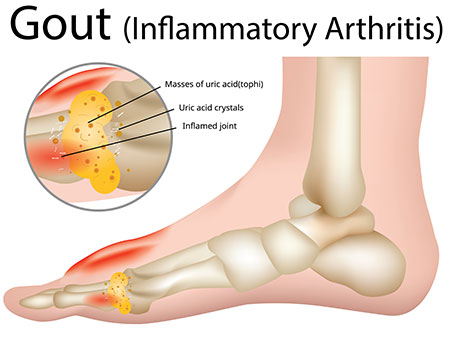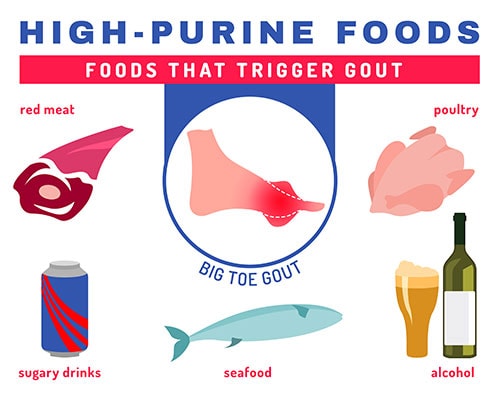For decades, research has shown a link between gout and coronary heart disease. In 2018, researchers from Duke University did a massive study to see if contemporary medical therapy for coronary artery disease changed the prognosis. They found that gout still results in an increased risk for cardiovascular events.
But why and how can gout affect your heart?

What are cardiovascular events?
Okay, people with gout have an increased incidence of cardiovascular events. But what does that mean?
The heart is arguably your body’s most important muscle. A cardiovascular event is any incident that might cause damage to the heart muscle. Well-known events include:
- Stroke
- Heart Attack (Myocardial Infarction)
- Atrial Fibrillation (Arrhythmia)
- Congestive Heart Failure
- Endothelial Dysfunction (non-obstructive coronary artery disease)
What causes gout?
Gout affects about 4% of the US population and is more common in men than women. Gouty arthritis is caused by hyperuricemia (increased serum uric acid levels). Uric acid is a natural product of normal food digestion. The kidneys are tasked with eliminating uric acid, but when the kidneys can’t keep up, excess uric acid builds up in the bloodstream.
Other gout risk factors include:
- Diet: Gout was once called the disease of kings, because it was associated with menus only royalty could afford, like fatty red meat, organ meats, shellfish, fine wines, and lots of liquor.
- Medical Conditions: Hypertension (high blood pressure), type 2 diabetes, obesity, metabolic syndrome, and chronic kidney disease can all increase your risk of gout.
- Family History: If other people in your family have had gout, you’re more likely to develop it.
- Sex: Men are more likely to have gout than women. However, after menopause, women’s uric acid levels rise and their gout risk increases.
What causes gout in feet?
Excess uric acid solidifies into needle-sharp urate crystals which usually collect in the joint where the big toe meets the foot. Why there? Well, uric acid solidifies at lower temperatures, and your body’s lowest temperatures are usually in the parts of your body furthest away from the heart – like the feet.
Gout can be excruciatingly painful. The big toe joint will swell, turn red, feel warm, and even the slightest touch can be agonizing. Fortunately, most gout attacks are sporadic and relatively infrequent.
Research confirms links between gout and heart disease
The 2018 study from Duke University focused on over 17,000 cardiovascular patients, of whom 1,406 had gout and were being treated for cardiovascular risk factors when the study began. The researchers followed the patients for an average of 6.4 years. Even though the patients with gout received aggressive modern therapy, their outcomes were still worse than those without gout.
Patients who had or developed gout over the course of the study had a 15% higher risk of dying of cardiovascular disease or suffering a heart attack. The risk of death from heart failure was doubled among those who had gout at the beginning of the study or developed it during the course of the study (compared to those who never had gout).
Awareness of the connections between gout and heart problems is not new. Earlier studies from Spain and Oxford University in England showed that gout is somehow associated with cardiovascular disease (as well as kidney disease, diabetes, cancer, and sleep apnea).
Gout and Cardiovascular Disease Risk
The connection between gout and cardiovascular disease is important for patients and healthcare professionals to be aware of. Even if a patient is already undergoing treatment for their heart disease, such as statins, their risk of cardiovascular mortality is still increased.
The best way to decrease your risk of heart failure is proper management of gout.
Why is gout related to heart disease?
Gout is an inflammatory condition. The primary theory for a long time was that systemic inflammation and oxidative stress were the links between gout and heart disease.
A recent case study found that uric acid crystals caused by gout can actually end up in the arteries – and even in the heart itself. While this was only one patient and no full clinical trials or cohort studies have been conducted, it does provide more insight into the possible link between gout and heart disease.
To further complicate matters, patients with gout often have other comorbidities such as diabetes, high systolic blood pressure, high cholesterol, and chronic kidney disease.
How to manage gout
Even without the increased risk of vascular disease, gout is an unpleasant condition. Luckily, with proper management and diet, it’s easy to avoid painful flareups. To manage gout with diet avoid the following foods:
- Beer and grain liquors
- Red meat and pork
- Seafood (especially shellfish)
- High-fructose products
And eat more low-purine foods:
- Fresh fruits and vegetables
- Nuts and Peanut butter
- Potatoes
- Grains, bread, and pasta
Your doctor may prescribe you a medication to help decrease your uric acid levels, such as a xanthine oxidase (XO) inhibitor (allopurinol or febuxostat) or colchicine (an anti-inflammatory). Inhibition of XO decreases uric acid production, while anti-inflammatories decrease swelling and uric acid accumulation in the joints.
No matter what your treatment method, be sure to follow up with your doctor as directed.
The doctors at UFAI are experts in treating gout
If you are experiencing problems with gout and your feet, the doctors at University Foot and Ankle are here to help. Using the latest technologies available, many of which we helped develop, we can accurately diagnose and treat your gout and the painful symptoms that accompany gout attacks.
Our nationally recognized podiatrists and foot and ankle specialists offer the most advanced foot and ankle care along with the highest success rates in the nation. We are leaders in the field of research and treatment of all foot and ankle conditions.
For a consultation please call (877) 736-6001 or make an appointment online now.
Our podiatrists take patients’ safety seriously. Our podiatry facility’s Covid-19 patient safety procedures exceed all the CDC’s coronavirus pandemic recommendations. Masks are always required in our institutes.
University Foot and Ankle Institute is conveniently located throughout Southern California and the Los Angeles area as our foot doctors are available at locations in or near Santa Monica, Beverly Hills, West Los Angeles, Manhattan Beach, Northridge, Downtown Los Angeles, Westlake Village, Granada Hills, and Valencia.
Sources
Krishnan E. Gout and the risk for incident heart failure and systolic dysfunction. BMJ Open. 2012; 2:e000282.
Singh, G., Lingala, B., Mithal, A. (2019). Gout and hyperuricaemia in the USA: prevalence and trends. Rheumatol. (Oxford) 58 (12), 2177–2180. doi: 10.1093/rheumatology/kez196
Zhao G, Huang L, Song M, Song Y. Baseline serum uric acid level as a predictor of cardiovascular disease related mortality and all-cause mortality: a meta-analysis of prospective studies. Atherosclerosis. 2013;231(1):61–8 PubMed PMID: 24125412. Epub 2013/10/16. eng.
Zhu Y, Pandya BJ, Choi HK. Comorbidities of gout and hyperuricemia in the US general population: NHANES 2007-2008. Am J Med 2012;125:679-87.e1.
- Avoiding Foot and Ankle Overuse Injuries While Dog Walking - July 17, 2023
- What is Floating Toe Syndrome? - June 12, 2023
- Is there a link between gout and heart disease? Studies Say Yes - February 22, 2022


Leave a Reply